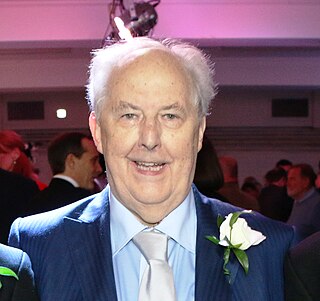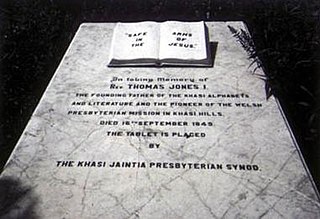Related Research Articles

Menai Bridge is a town and community on the Isle of Anglesey in north-west Wales. It overlooks the Menai Strait and lies by the Menai Suspension Bridge, built in 1826 by Thomas Telford, just over the water from Bangor. With a population of 3,376, it is the fifth largest town on the island. The built-up area including Llandegfan had a population of 4,958.

David Benjamin Rees is a Welsh and English-language publisher, author, lecturer and minister in the Presbyterian Church of Wales since 1962. He is a leader of the Welsh community in Liverpool, and heads one of the city's five remaining Welsh chapels. His small publishing house, Modern Welsh Publications Ltd, was established in 1963 and from 1963 to 1968 it operated from Abercynon in the Cynon Valley of South Wales. Since 1968 it has operated from Allerton, Liverpool and is the only Welsh language publishing house still operating in the city of Liverpool.
John Hughes Morris (1870–1953) was born in Penrhosllugwy, Anglesey but moved to Liverpool as a young lad. He only received elementary education at Chatsworth School, Liverpool but he had considerable talent, and when he was 22 years of age he came to work at the office of the Foreign Mission in Falkner Street, near the Philharmonic Hall. This mission began in Liverpool in 1840 by the Presbyterian church of Wales Morris remained at this office till 1949, a period of 57 years.
This article is about the particular significance of the year 1846 to Wales and its people.
This article is about the particular significance of the year 1849 to Wales and its people.

Thomas Jones was a Welsh Christian missionary, who worked among the Khasi people of Meghalaya and Assam in India and of Bangladesh. He recorded the Khasi language in Roman script, and the inscription on his gravestone calls him "The founding father of the Khasi alphabet and literature".
This article is about the particular significance of the year 1823 to Wales and its people.
This article is about the particular significance of the year 1802 to Wales and its people.
This article is about the particular significance of the year 1800 to Wales and its people.
Griffith Wynne Griffith was a Welsh Presbyterian minister, who became one of the leaders of the denomination. He was also editor of two journals, a member of the committee for a new translation of the Bible into Welsh and a member of the Council and Court of Governors of University College, Bangor. He also wrote and translated many hymns.
The Presbyterian Church of India (PCI) is a mainline Protestant church based in India, with over one and a half million adherents, mostly in Northeast India. It is one of the largest Christian denominations in that region.
Dilys Grace Edmunds (1879–1926), an early twentieth century teacher in India from a Welsh Calvinistic Methodist background, whose fund-raising work supported school building programmes in the Karimanj District of India.
Sir Roland de Velville was a Breton-born English soldier and government official who is theorised as the illegitimate son of King Henry VII of England by "a Breton lady whose name is not known", or as a favoured member of the court of Henry VII and later recipient of beneficences, brought home to England with 28-year-old Henry after his exile in Brittany, an adolescent "of unknown parentage", and so a possible or likely illegitimate son, with formal historical opinion undecided.

St Beuno's Church, Trefdraeth is the medieval parish church of Trefdraeth, a hamlet in Anglesey, north Wales. Although one 19th-century historian recorded that the first church on this location was reportedly established in about 616, no part of any 7th-century structure survives; the oldest parts of the present building date are from the 13th century. Alterations were made in subsequent centuries, but few of them during the 19th century, a time when many other churches in Anglesey were rebuilt or were restored.
Esther Lewis, born Esther Evans, was a Welsh educator and Presbyterian missionary in India and Bangladesh.
Edwin Rowlands was a Welsh Christian missionary in northeast India and Burma. He was a professional teacher, singer, composer, poet, translator and literary figure among the Mizo people. He was regarded as the most beloved of all British missionaries in Mizoram. He was more popularly known as Zosapthara. He made the major hymns in Mizo and Khumi which are still in use. He modified the original Mizo alphabet and his system became the standard in Mizo language. He created written language for Khumi people in Burma, and for Bhil people in Maharashtra. His literary works are the foundation of Mizo literature. He was the first administrator of education in Mizoram as Honorary Inspector of Schools. Despite objection from various corners he married Thangkungi, a Mizo girl.
Julia Bastin was a Belgian academic, educator and novelist.
Owen Prys was a Calvinistic Methodist minister and first Principal of the United Theological College in Aberystwyth in Wales (1906–27) and Moderator of the Presbyterian Church of Wales in 1910. The Welsh scholar Sir Ifor Williams described him as one of the most powerful preachers of the 20th-century.
References
- ↑ Jones, Gwilym Arthur. "ROWLANDS , JANE HELEN". Dictionary of Welsh Biography. Retrieved 16 April 2016.
- 1 2 3 Rees 2002, p. 205.
- 1 2 Codell 2003, p. 256.
Bibliography
- Codell, Julie F. (2003). Imperial Co-histories: National Identities and the British and Colonial Press. Fairleigh Dickinson Univ Press. ISBN 978-0-8386-3973-3.
- Rees, D. Ben (2002). Vehicles of Grace and Hope: Welsh Missionaries in India, 1800-1970. William Carey Library. ISBN 978-0-87808-505-7.